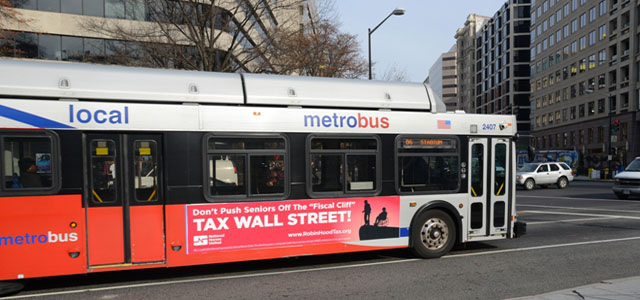Blog
Don’t Push Seniors Off the ‘Fiscal Cliff’

December 3, 2012 by Chuck Idelson
With the November election rapidly fading into memory and the basic building blocks of a civil society once again under grave threat from Wall Street and their acolytes in Washington, nurses and other activists have, once again, had to step up the fight to protect basic programs and make the case for real revenue needed to build a sustainable future.
As December opened, National Nurses United unveiled a stark image of seniors precariously perched on the edge of the “fiscal cliff” and facing a questionable future as the White House and leaders in Congress debated their future.
“Don’t Push Seniors Off the ‘Fiscal Cliff.’ Tax Wall Street” is the message. NNU placed the image on more than 100 buses crisscrossing Washington, as well as on billboards in several cities across the U.S., part of a growing campaign by nurses and others insisting that Washington not throw seniors or American families in general under the “fiscal cliff” bus.
Concurrently, NNU is planning candlelight vigils outside some 20 Congressional offices, from Florida to California, on December 10, at some of them joining with members of a number of unions who are also pressing for a firm hand in Washington.
It won’t be the first time nurses have been in the streets since the election calling on Congress and the President to reject more punishing cuts demanded by those Nobel economist Paul Krugman calls “the deficit scolds,” and support for a meaningful tax on Wall Street speculation, the Robin Hood tax.
On November 14, nurses, HIV/AIDS activists, and other Robin Hood campaigners went to several Congressional offices with a similar message.
“This country has vast wealth but poor priorities,” said NNU Co-President Jean Ross, RN. “Social Security, Medicare, Medicaid, and the food stamp program are the economic bedrock of vast numbers of American families. To reduce these in any way is to do serious harm and lead to more poverty. We as nurses shudder at the thought of more harm to Americans. Don’t do it.”
There’s ample reason for concern. Despite pledges from the President, in meetings with labor and liberal policy groups since the election, and some tough language from a number of Democratic leaders, we’ve seen this movie before.
Nurses and other activists well remember the concessions made by President Obama and other Democratic leaders during first term debt ceiling discussions, and the President’s own statement during the first debate this fall that he and Republican candidate Mitt Romney, then titular leader of the “deficit scold” camp, had no real differences on Social Security. It was a statement that caused lots of angst on the left, and prompted a hurried response from the campaign that “President Obama will never privatize Social Security or undermine retirement security for middle-class Americans.”
But the mixed signals from Washington in late November remained worrisome. Illinois Sen. Dick Durbin, probably as close to Obama as anyone in the Senate, has dropped broad hints that the White House and top Democrats will agree to at least $400 billion in “entitlement” cuts and probably far more as the carrot to get votes for tax increases for the wealthiest Americans. That’s the price demanded by intransigent Republicans, whose hard line, some seem to have trouble remembering, was fully repudiated by voters on November 6.
What will the cuts be? Presumably some combination, speculated Politico, of “means-testing, raising the retirement age and other ‘efficiencies’ to be named later.”
Those cuts are exactly what nurses and other activists hope to head off. Why? Four years after Wall Street and the banksters crashed the U.S. and global economies, far too many families are still hurting. The priority in Washington should be economic recovery and revitalization, “building a sustainable full employment economy,” as PERI co-director Robert Pollin as aptly written, not further cuts in critical programs.
Whether emerging under the guise of the Simpson-Bowles recommendations, or negotiations over the debt ceiling, “fiscal cliff,” or a “grand bargain,” nurses and other activists know too many of the proposed solutions would just cause far greater suffering in Main Street communities while once again rewarding the Wall Street gamblers and titans who are the ultimate recipients of any money thrown at the debt. Krugman put it well when he wrote: “The deficit-scold movement was never really about the deficit. Instead, it was about using deficit fears to shred the social safety net.”
There are allies in Congress, of course, who can be counted on to oppose this sham, such as Rep. Keith Ellison who in response to the reported deal said:
“Progressives will not support any deal that cuts benefits for families and seniors who rely on Medicare, Medicaid and Social Security to put food on the table or cover their health costs. Last year, over 80 members of the Progressive, Black, and Asian Pacific-Islander Caucuses stood united in opposing an agreement that cut benefits for these families, and 44 members have introduced a resolution demanding these cuts be off the table.”
Instead of further bailouts for Wall Street, nurses say, it’s time to hold banks and investment firms accountable to revitalize the economies they did so much to damage. The best response is with a robust Robin Hood tax, HR 6411, the Inclusive Prosperity Act, introduced by Ellison for the Robin Hood campaign, which sets a small sales tax on the trading of stocks, bonds, derivatives, currencies, and other financial instruments, with a big bang for the economy, up to $350 billion every year for jobs, healthcare, and other vital needs.
That’s the message nurses are bringing to Washington, with the protests, and the latest ad campaign.